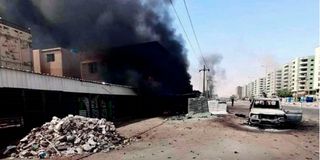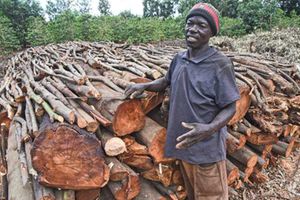Alarm over surge in sexual violence in Sudan

Smoke rises from a building next to a damaged car on a street in Khartoum, Sudan. Gender and human rights activists have raised the red flag over the skyrocketing number of women and girls experiencing sexual violence due to the ongoing war in the country.
What you need to know:
- Reports indicate the war has seen at least 12 incidents of conflict-related sexual violence against at least 37 women, with at least three involving young girls.
- UN High Commissioner for Human Rights Chairperson Jeremy Laurence, in a statement, said his organisation is concerned.
Gender and human rights activists have raised the red flag over the skyrocketing number of women and girls experiencing sexual violence due to the ongoing war in Sudan.
Reports indicate the war has seen at least 12 incidents of conflict-related sexual violence against at least 37 women, with at least three involving young girls.
Activists on the ground confirmed the severity of the situation based on the reported cases in Khartoum and other states. UN High Commissioner for Human Rights Chairperson Jeremy Laurence, in a statement, said his organisation is concerned.
“Since the fighting began, our office has received credible reports of 12 incidents of sexual violence related to the conflict, against at least 37 women, although the number could be higher. In at least three incidents, the victims were young girls. In one case, 18 to 20 women were reportedly raped,” said Mr Laurence.
Access to prevention and response services for the victims and survivors have been severely limited in Khartoum and across the country following destruction and looting of healthcare centres and hospitals.
Pregnant and lactating women are already severely malnourished, food shortages, coupled with the temporary suspension of humanitarian aid, have heightened consequences for women and girls, who have been disproportionately dependent on it.
Economic pressure
The UN agency has warned that the increasing economic pressure and societal militarisation is further heightening sexual exploitation and gender-based violence.
In May, a section of African Women Leaders united in solidarity with women and girls in the wake of the civil war. They came together through the African Union Special Envoy on Women, Peace, and Security; UN Women; and the African Women Leaders Network.
They embarked on a campaign to support and amplify calls to end the conflict to alleviate the suffering of women and girls who bear the brunt of the war. The leaders discussed ways to advocate an end to the conflict during a virtual meeting convened by Ms Bineta Diop, the African Union Special Envoy for Women Peace and Security.
They highlighted the impact on women and girls and vowed to mobilise support to peacebuilding and protection efforts. The leaders argued that with women and girls facing severe and disproportionate impacts of the crisis, their involvement in response and meditation efforts will be crucial to ensuring gender-equal aid, as well as to building lasting peace.
The leaders included former Liberia President Ellen Johnson Sirleaf, Ms Phumzile Mlambo-Ngcuka, former UN Women Executive Director, and Raychelle Omamo, Kenya’s former foreign minister.
71 children dead
The UN, in a separate statement, said more than 71 children have died at an orphanage in Khartoum since the fighting started, citing lack of humanitarian assistance, including medical supplies.
“We reiterate the High Commissioner’s call on both parties to the fighting to ensure protection of civilians and respect for international humanitarian law and international human rights law. They must also ensure all violations are effectively and independently investigated and those responsible are held accountable,” the UN statement read.
Since fighting between Sudan’s army and the paramilitary Rapid Support Forces erupted April 15, Sudan’s Federal Ministry of Health says nearly 800 people have been killed and 5,800 wounded.
According to the United Nations High Commissioner for Refugees, about 1.42 million people are internally displaced and nearly half a million have crossed borders as refugees.





